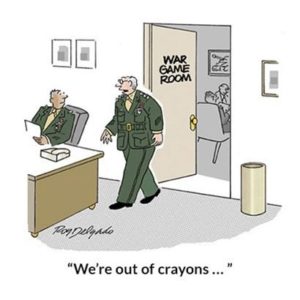In this part of the series we have a look at the types of war. War has been classified into various types over the years depending upon factors like extent, duration, cause, means and domains etc.
TYPES OF WAR
Total War. In the mid-19th century, scholars identified total war as a separate class of warfare. The term has been defined as “A war that is unrestricted in terms of the weapons used, the territory or combatants involved, or the objectives pursued, especially one in which the laws of war could be disregarded.” Total war is a war, which a country devotes its entire human, economic and military resources. Targets are not restricted to the army. Civilians also get attacked for the purpose “total” victory over the enemy’s political, social and military structure.
Limited War. Limited war is the opposite concept to total war. A limited war is one in which the belligerents do not expend all of the resources at their disposal, whether human, industrial, agricultural, military, natural, technological, or otherwise in a specific conflict. The War is limited by geographical area, type of target, weapons or degree of mobilization.
World War. This is “a war engaged in by all or most of the principal nations of the world”. The term is usually reserved to two major international conflicts that occurred during the 20th century: World War I (1914–18) and World War II (1939–45). However, a variety of global conflicts have been subjectively deemed “world wars”, such as the Cold War and the War on Terror.
Civil War. Civil war is war within one’s own geographic boundaries, usually between people of different ethnic or religious groups or with different ideology. Its total chaos with multiple groups randomly fighting against each other, sometimes not really sure who is a friend or foe, but still creating a lot of blood bath. The ultimate goal is often lost in the carnage, with no definite winners. (Most often the only loser is humanity).
Religious War or Holy War. A war between religions or over religious issues (primarily caused or justified by differences in religion). It is also called jihad or crusade. In the modern period, debates are common over the extent to which religious, economic, or ethnic aspects of a conflict predominate in a given war
Cold War. Cold war is a state of conflict between nations that does not involve direct military action but is pursued primarily through economic and political actions, propaganda, acts of espionage or proxy wars waged by surrogates. This term is most commonly used to refer to the Soviet–American Cold War of 1947–1991. The surrogates are typically states that are satellites of the conflicting nations, i.e., nations allied to them or under their political influence. Opponents in a cold war often provide economic or military aid, such as weapons, tactical support or military advisors, to lesser nations involved in conflicts with the opposing country.
Colonial War. Colonial war is a blanket term relating to the various conflicts that arose as the result of overseas territories being settled by foreign powers creating a colony. The term especially refers to wars fought during the nineteenth century between European armies in Africa, Asia and the Caribbean.
Ideological War. A clash of opposing ideals, ideologies, or concepts through which nations or groups use strategic influence to promote their interests abroad.
Revolutionary War. A war fought with the aim of overthrowing a corrupt or ineffective government.
Military classifications
Military conflict. When armies of two groups fight with weapons to gain supremacy on its opponent. It may be to grab territory, extend borders, extend influence, or to become more powerful. It’s as old as humanity and the list is endless.
Insurgency. Insurgency is a violent, armed rebellion against authority. An insurgency can be fought via counter-insurgency warfare, and may also be opposed by measures to protect the population and by political and economic actions of various kinds, as well as propaganda aimed at undermining the insurgents’ claims against the incumbent regime. As a concept, insurgency’s nature is ambiguous. Not all rebellions are insurgencies.
Proxy War. Proxy war is an armed conflict between two states or non-state actors which act on the instigation or on behalf of other parties that are not directly involved in the hostilities. In order for a conflict to be considered a proxy war, there must be a direct, long-term relationship between external actors and the belligerents involved. The aforementioned relationship usually takes the form of funding, military training, arms, or other forms of material assistance which assist a belligerent party in sustaining its war effort.
Guerrilla War. Guerrilla war is usually a hit-and-run war waged by an apparently weaker army, against a relatively much larger but less mobile highly organised army. Usually undertaken by a militia group of the defeated or near defeated people who are desperate to drive the invaders away. For them, its total war, whereas for the standing army it’s only a partial war, who are less motivated, and actually, pretty wary.
Militancy. Militancy is a war of terrorists with a desire to inflict damage to those they hate the most, but can’t directly win with a full-scale armed military conflict. They create maximum nuisance at minimum cost and kill as many innocents as they can and claim victory.
Domains Wise Classification
Besides the domains of land (ground war), Air (air war) and sea (naval war), other domains are as follows:
Economic war. You don’t fire bullets and mortars, but use economic strength to throttle the other nation to submission. This is a sophisticated modern day invasion strategy. Strategy of sanctions, unfair trade practices and debt traps are used in this type of warfare.
Diplomatic Wars. It is the typical war that goes on between hostile nations at an apparently civilised international platform, like the UN. It’s all about gaining a few brawny points in a war of words in front of an international audience, most of whom are generally biased.
Nuclear Warfare. This is a war fought with nuclear weapons. It is too risky and mutual destruction is assured. So far it is restricted to threats and as a deterrent.
Cyber war. Cyber warfare involves the actions by a nation-state or international organization to attack and attempt to damage another nation’s computers or information networks through, computer viruses or denial-of-service attacks. Computer technology is used to disrupt the activities of a state or organization, especially the deliberate attacking of information systems for strategic or military purposes and cyber espionage.
Space war. Space warfare is combat that takes place in outer space. The scope of space warfare therefore includes ground-to-space warfare, such as attacking satellites from the earth; space-to-space warfare, such as satellites attacking satellites; and space-to-ground warfare, such as satellites attacking earth-based targets.
Psychological warfare. Literally, a war of words and nerves. You try to wrestle your opponent by wearing him down through constant threats of violence.
The nature of war is changing very rapidly. New classifications are being made to describe the prevailing situations. More about these changes and classifications later.
Coming up next: Warfare definition and types
Value additions are most welcome
References:
- https://core.ac.uk/download/pdf/12857871.pdf
- https://smallwarsjournal.com/jrnl/art/what-is-war-a-new-point-of-view
- Brian Orend, “War”, The Stanford Encyclopedia of Philosophy (Fall 2008 Edition), ed. Edward N. Zalta, accessed September 18, 2012.
- http://plato.stanford.edu/archives/fall2008/entries/war/.
- Carl von Clausewitz, On War, ed. and trans. Michael Howard and Peter Paret (Princeton, NJ: Princeton University Press, 1976), 75
- Joseph S. Nye, The Future of Power, (New York, NY: Public Affairs), 113.
- Thomas L. Friedman, The World is Flat: A Brief History of the 21stCentury, 2005 (New York, NY: Farrar, Straus and Giroux).
- Michael Howard, The Causes of War from the Causes of War and Other Essays, (Cambridge, MA: Harvard University Press, 1983), 16.
- United States Government, The Financial Crisis Inquiry Report, January 2011, (Washington, DC: U.S. Government Printing Office), 417-420.
- Jack Sine, Defining the ‘Precision weapon’ in effects-based terms, Air & Space Power Journal, Spring 2006, accessed March 3, 2011, http://www.freepatentsonline.com/article/Air-Space-Power-Journal/154817984.html.
- General Norton A. Schwartz and Admiral Jonathan W. Greenert, “Air-Sea Battle: Promoting Stability in an Era of Uncertainty”, The American Interest, February 12, 2012, accessed September 12, 2012.
- http://www.the-american-interest.com/article.cfm?piece=1212.
- Robert C. Nation, U.S. Army War College Seminar Lecture, September 6, 2012.
- Gene Sharp, The Role of Power in Nonviolent Struggle, (Boston, MA: The Albert Einstein Institution, 1990), 9.Sun Tzu, The Art of War, trans. Samuel B. Griffith (New York: Oxford University Press, 1963).










